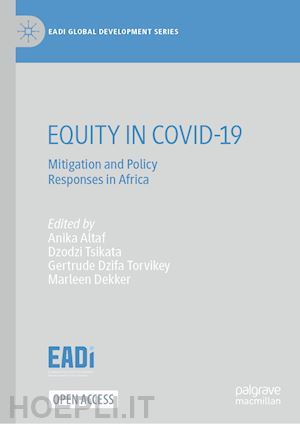

Questo prodotto usufruisce delle SPEDIZIONI GRATIS
selezionando l'opzione Corriere Veloce in fase di ordine.
Pagabile anche con Carta della cultura giovani e del merito, 18App Bonus Cultura e Carta del Docente
This Open Access edited volume presents twelve African case studies that systematically reconstruct, document and analyse how national governments and other stakeholders took equity into account in their initial policy responses to the COVID-19 pandemic. At the onset of the pandemic, many African governments acted quickly to suppress the virus through various public health measures, including lockdowns, mobilizing healthcare resources and designing responses to support the economy and the population. There were, however, significant variations in the severity and type of measures taken, as well as their accessibility and impacts. Equity was not a given and, therefore, important questions have been raised about who benefitted and who were left unprotected from the interventions, particularly those designed to protect income and basic services? The book, based on a variety of empirical data and disciplinary perspectives of research teams from across the continent, examines the inclusivity of mitigation and policy responses. It situates these findings on short-term interventions and impact in debates about the longer-term implications of the COVID-19 pandemic on the development of the African continent and proposes new directions for policy, research and practice in responses and interventions during crises.
Chapter 1: Introduction.- PART I: Western Africa.- Chapter 2: Benin.- Chapter 3: Burkina Faso.- Chapter 4: Ghana.- Chapter 5: Mali.- Chapter 6: Niger.- Chapter 7: Nigeria.- PART II: Eastern Africa.- Chapter 8 : Ethiopia.- Chapter 9: Kenya.- Chapter 10: Mozambique.- Chapter 11: Rwanda.- Chapter 12: Uganda.- PART III: Northern Africa.- Chapter 13: Tunisia.- Chapter 14: Conclusion.- Chapter 15: Reflections and Recommendations.
Dr. Anika Altaf is executive director at INCLUDE knowledge platform for Inclusive Development Policies. Her areas of expertise are inclusive development, human wellbeing and translating research into policy and practice.
Dzodzi Tsikata is Distinguished Professor of Development Studies at SOAS, University of London, and the immediate past Director of the Institute of African Studies (IAS) at the University of Ghana.
Dr. Gertrude Dzifa Torvikey is a Research Fellow at the Institute of Statistical, Social and Economic Research (ISSER), University of Ghana. She is also Programme Officer at Feminist Africa at the Institute of African Studies, University of Ghana.
Marleen Dekker is Professor of Inclusive Development in Africa at Leiden University and Director of the African Studies Centre Leiden. From 2014 to 2021, Marleen was the coordinator of the INCLUDE Secretariat.











Il sito utilizza cookie ed altri strumenti di tracciamento che raccolgono informazioni dal dispositivo dell’utente. Oltre ai cookie tecnici ed analitici aggregati, strettamente necessari per il funzionamento di questo sito web, previo consenso dell’utente possono essere installati cookie di profilazione e marketing e cookie dei social media. Cliccando su “Accetto tutti i cookie” saranno attivate tutte le categorie di cookie. Per accettare solo deterninate categorie di cookie, cliccare invece su “Impostazioni cookie”. Chiudendo il banner o continuando a navigare saranno installati solo cookie tecnici. Per maggiori dettagli, consultare la Cookie Policy.